Evaluating Basic Counselling Skills in Effective Counselling Sessions
VerifiedAdded on 2022/10/12
|7
|2004
|88
Essay
AI Summary
This essay, focusing on psychology, delves into the crucial role of basic counselling skills in achieving effective counselling outcomes. It defines counselling as a process of building relationships to promote psychological health and well-being. The essay highlights key skills such as demonstrating empathy, reflecting on content and feelings, clarifying information, and asking open-ended questions. It emphasizes the importance of these skills in building trust and rapport with clients, facilitating their journey towards solving mental health issues. The author evaluates each skill through personal experiences and role-playing scenarios, including demonstrating empathy, reflecting on content and feelings, and using clarification and open-ended questions. The essay also acknowledges limitations of each skill. The essay concludes with a reflection on the author's ongoing development as a counsellor and a commitment to refining these skills through continuous learning and practical application.
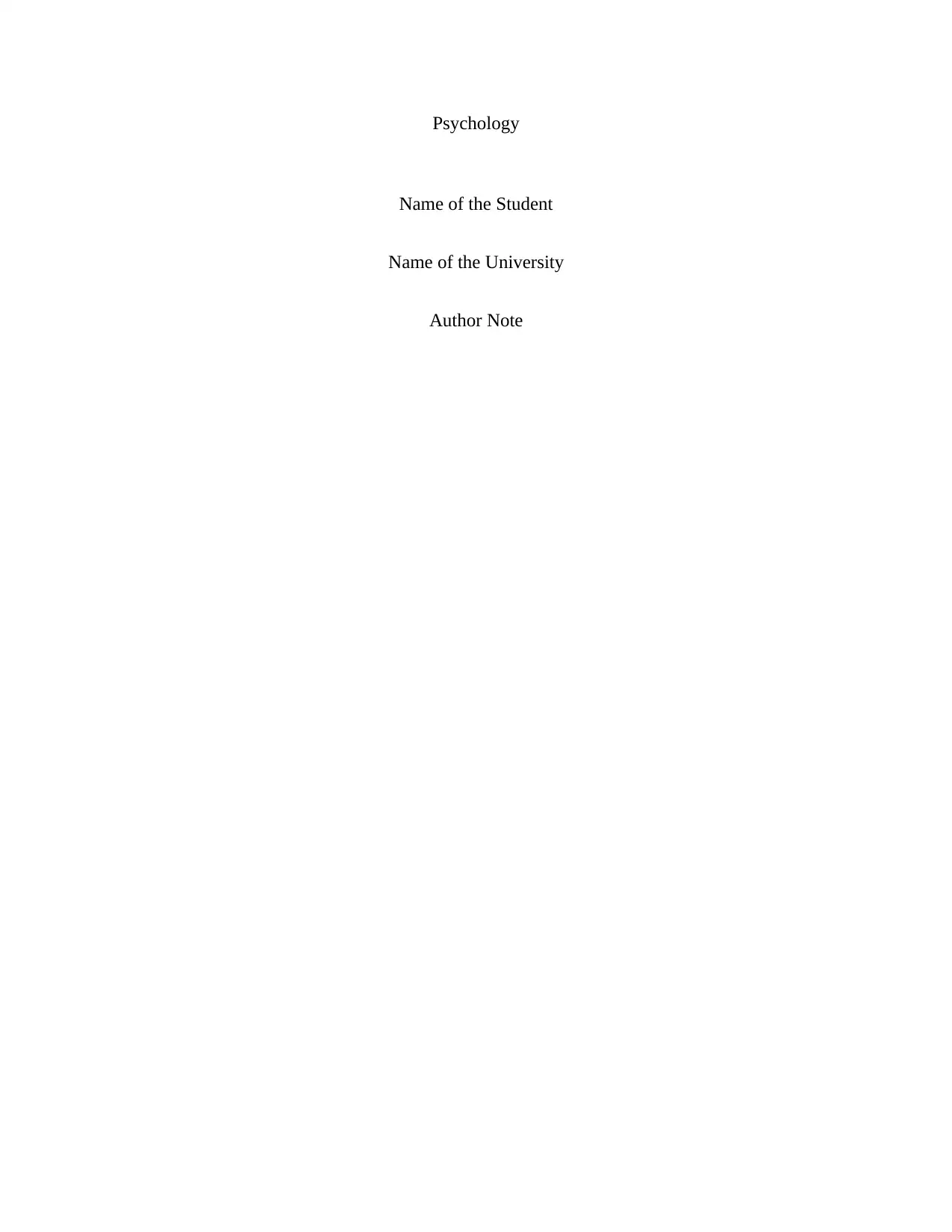
Psychology
Name of the Student
Name of the University
Author Note
Name of the Student
Name of the University
Author Note
Paraphrase This Document
Need a fresh take? Get an instant paraphrase of this document with our AI Paraphraser
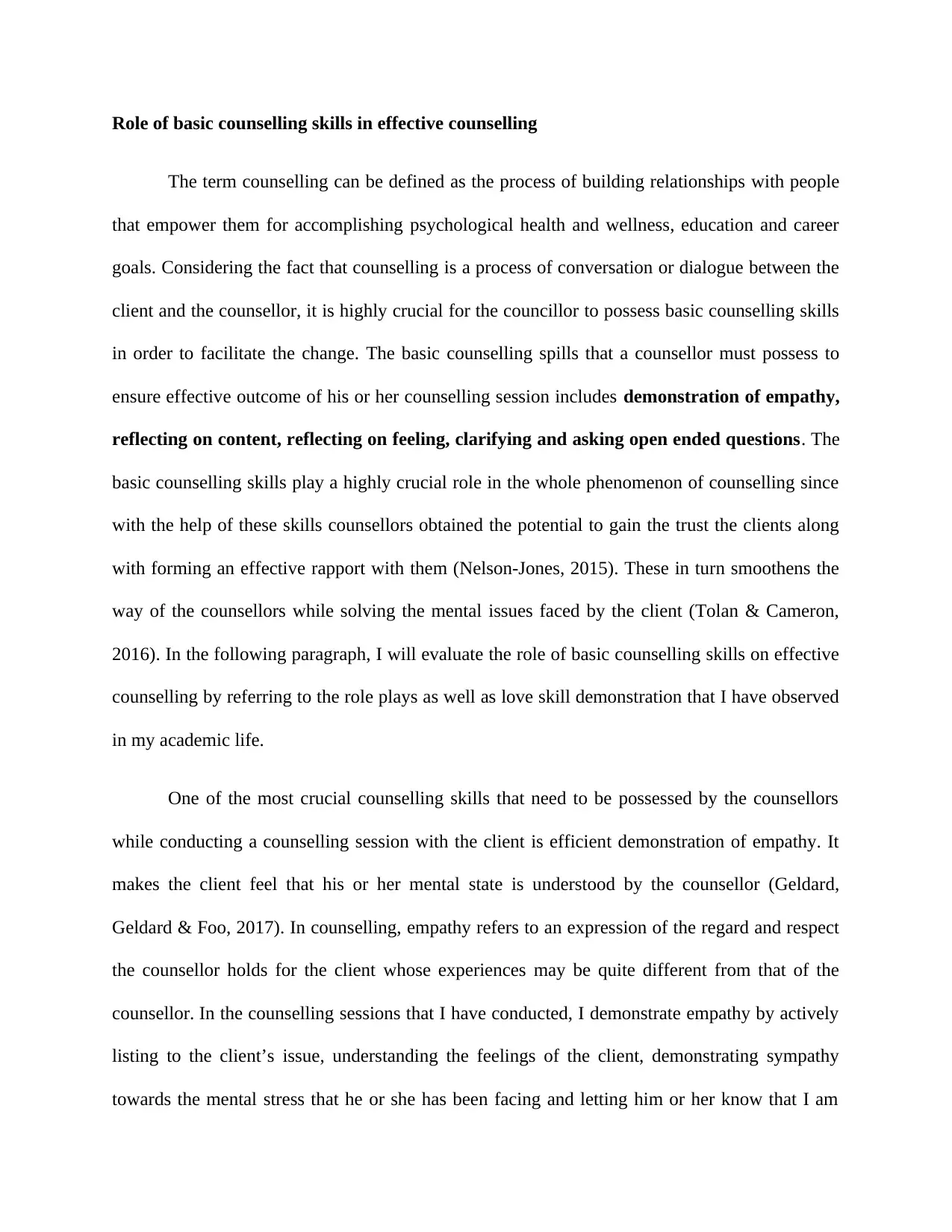
Role of basic counselling skills in effective counselling
The term counselling can be defined as the process of building relationships with people
that empower them for accomplishing psychological health and wellness, education and career
goals. Considering the fact that counselling is a process of conversation or dialogue between the
client and the counsellor, it is highly crucial for the councillor to possess basic counselling skills
in order to facilitate the change. The basic counselling spills that a counsellor must possess to
ensure effective outcome of his or her counselling session includes demonstration of empathy,
reflecting on content, reflecting on feeling, clarifying and asking open ended questions. The
basic counselling skills play a highly crucial role in the whole phenomenon of counselling since
with the help of these skills counsellors obtained the potential to gain the trust the clients along
with forming an effective rapport with them (Nelson-Jones, 2015). These in turn smoothens the
way of the counsellors while solving the mental issues faced by the client (Tolan & Cameron,
2016). In the following paragraph, I will evaluate the role of basic counselling skills on effective
counselling by referring to the role plays as well as love skill demonstration that I have observed
in my academic life.
One of the most crucial counselling skills that need to be possessed by the counsellors
while conducting a counselling session with the client is efficient demonstration of empathy. It
makes the client feel that his or her mental state is understood by the counsellor (Geldard,
Geldard & Foo, 2017). In counselling, empathy refers to an expression of the regard and respect
the counsellor holds for the client whose experiences may be quite different from that of the
counsellor. In the counselling sessions that I have conducted, I demonstrate empathy by actively
listing to the client’s issue, understanding the feelings of the client, demonstrating sympathy
towards the mental stress that he or she has been facing and letting him or her know that I am
The term counselling can be defined as the process of building relationships with people
that empower them for accomplishing psychological health and wellness, education and career
goals. Considering the fact that counselling is a process of conversation or dialogue between the
client and the counsellor, it is highly crucial for the councillor to possess basic counselling skills
in order to facilitate the change. The basic counselling spills that a counsellor must possess to
ensure effective outcome of his or her counselling session includes demonstration of empathy,
reflecting on content, reflecting on feeling, clarifying and asking open ended questions. The
basic counselling skills play a highly crucial role in the whole phenomenon of counselling since
with the help of these skills counsellors obtained the potential to gain the trust the clients along
with forming an effective rapport with them (Nelson-Jones, 2015). These in turn smoothens the
way of the counsellors while solving the mental issues faced by the client (Tolan & Cameron,
2016). In the following paragraph, I will evaluate the role of basic counselling skills on effective
counselling by referring to the role plays as well as love skill demonstration that I have observed
in my academic life.
One of the most crucial counselling skills that need to be possessed by the counsellors
while conducting a counselling session with the client is efficient demonstration of empathy. It
makes the client feel that his or her mental state is understood by the counsellor (Geldard,
Geldard & Foo, 2017). In counselling, empathy refers to an expression of the regard and respect
the counsellor holds for the client whose experiences may be quite different from that of the
counsellor. In the counselling sessions that I have conducted, I demonstrate empathy by actively
listing to the client’s issue, understanding the feelings of the client, demonstrating sympathy
towards the mental stress that he or she has been facing and letting him or her know that I am
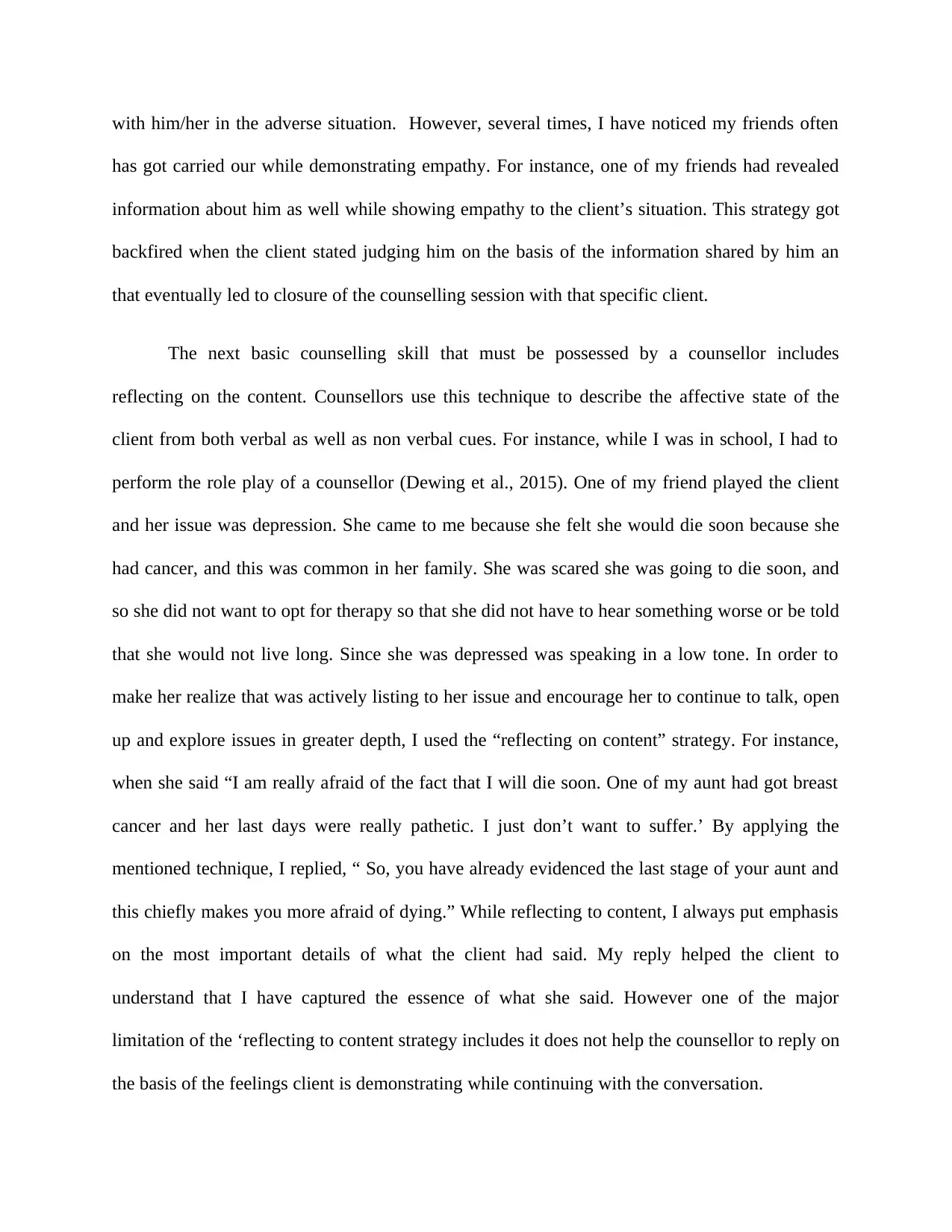
with him/her in the adverse situation. However, several times, I have noticed my friends often
has got carried our while demonstrating empathy. For instance, one of my friends had revealed
information about him as well while showing empathy to the client’s situation. This strategy got
backfired when the client stated judging him on the basis of the information shared by him an
that eventually led to closure of the counselling session with that specific client.
The next basic counselling skill that must be possessed by a counsellor includes
reflecting on the content. Counsellors use this technique to describe the affective state of the
client from both verbal as well as non verbal cues. For instance, while I was in school, I had to
perform the role play of a counsellor (Dewing et al., 2015). One of my friend played the client
and her issue was depression. She came to me because she felt she would die soon because she
had cancer, and this was common in her family. She was scared she was going to die soon, and
so she did not want to opt for therapy so that she did not have to hear something worse or be told
that she would not live long. Since she was depressed was speaking in a low tone. In order to
make her realize that was actively listing to her issue and encourage her to continue to talk, open
up and explore issues in greater depth, I used the “reflecting on content” strategy. For instance,
when she said “I am really afraid of the fact that I will die soon. One of my aunt had got breast
cancer and her last days were really pathetic. I just don’t want to suffer.’ By applying the
mentioned technique, I replied, “ So, you have already evidenced the last stage of your aunt and
this chiefly makes you more afraid of dying.” While reflecting to content, I always put emphasis
on the most important details of what the client had said. My reply helped the client to
understand that I have captured the essence of what she said. However one of the major
limitation of the ‘reflecting to content strategy includes it does not help the counsellor to reply on
the basis of the feelings client is demonstrating while continuing with the conversation.
has got carried our while demonstrating empathy. For instance, one of my friends had revealed
information about him as well while showing empathy to the client’s situation. This strategy got
backfired when the client stated judging him on the basis of the information shared by him an
that eventually led to closure of the counselling session with that specific client.
The next basic counselling skill that must be possessed by a counsellor includes
reflecting on the content. Counsellors use this technique to describe the affective state of the
client from both verbal as well as non verbal cues. For instance, while I was in school, I had to
perform the role play of a counsellor (Dewing et al., 2015). One of my friend played the client
and her issue was depression. She came to me because she felt she would die soon because she
had cancer, and this was common in her family. She was scared she was going to die soon, and
so she did not want to opt for therapy so that she did not have to hear something worse or be told
that she would not live long. Since she was depressed was speaking in a low tone. In order to
make her realize that was actively listing to her issue and encourage her to continue to talk, open
up and explore issues in greater depth, I used the “reflecting on content” strategy. For instance,
when she said “I am really afraid of the fact that I will die soon. One of my aunt had got breast
cancer and her last days were really pathetic. I just don’t want to suffer.’ By applying the
mentioned technique, I replied, “ So, you have already evidenced the last stage of your aunt and
this chiefly makes you more afraid of dying.” While reflecting to content, I always put emphasis
on the most important details of what the client had said. My reply helped the client to
understand that I have captured the essence of what she said. However one of the major
limitation of the ‘reflecting to content strategy includes it does not help the counsellor to reply on
the basis of the feelings client is demonstrating while continuing with the conversation.
⊘ This is a preview!⊘
Do you want full access?
Subscribe today to unlock all pages.

Trusted by 1+ million students worldwide
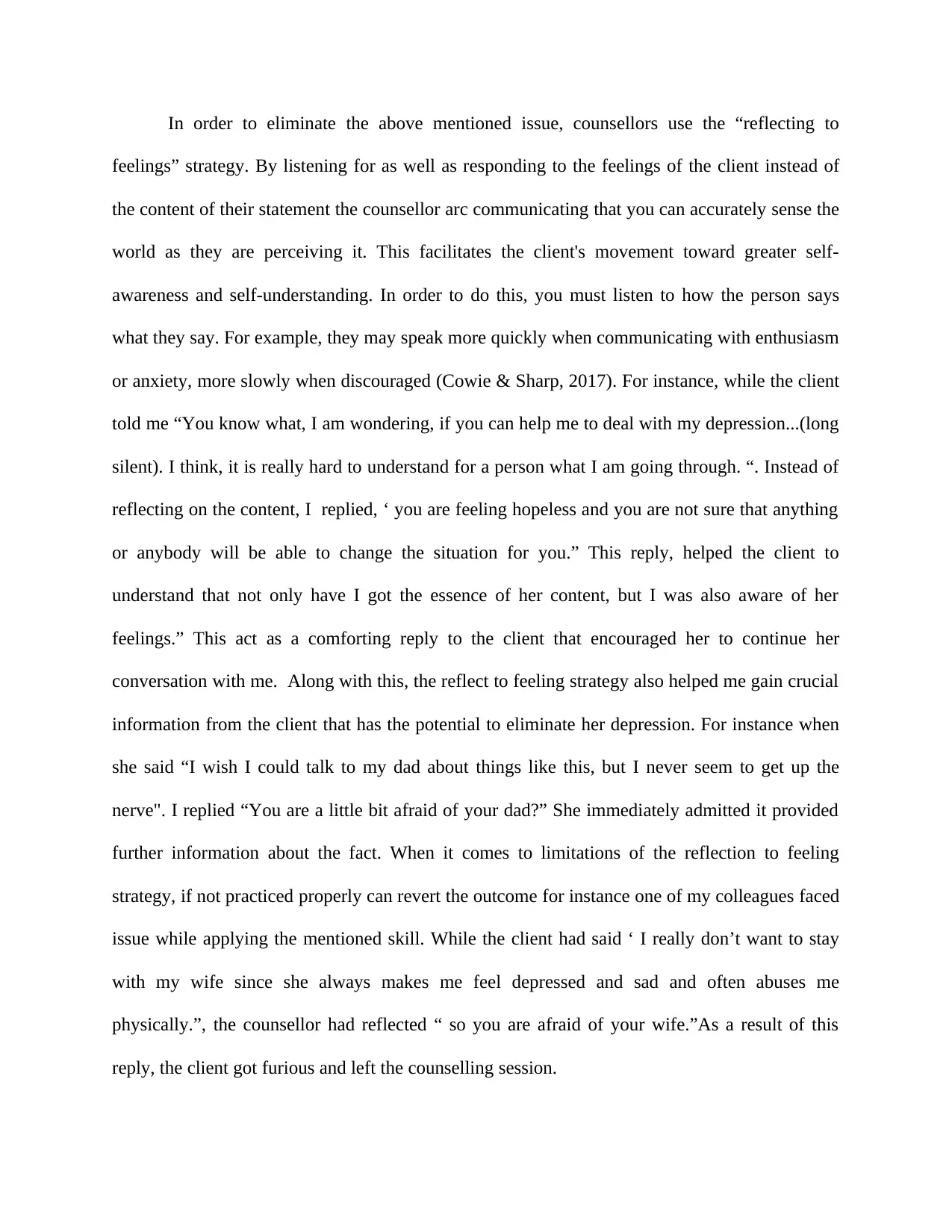
In order to eliminate the above mentioned issue, counsellors use the “reflecting to
feelings” strategy. By listening for as well as responding to the feelings of the client instead of
the content of their statement the counsellor arc communicating that you can accurately sense the
world as they are perceiving it. This facilitates the client's movement toward greater self-
awareness and self-understanding. In order to do this, you must listen to how the person says
what they say. For example, they may speak more quickly when communicating with enthusiasm
or anxiety, more slowly when discouraged (Cowie & Sharp, 2017). For instance, while the client
told me “You know what, I am wondering, if you can help me to deal with my depression...(long
silent). I think, it is really hard to understand for a person what I am going through. “. Instead of
reflecting on the content, I replied, ‘ you are feeling hopeless and you are not sure that anything
or anybody will be able to change the situation for you.” This reply, helped the client to
understand that not only have I got the essence of her content, but I was also aware of her
feelings.” This act as a comforting reply to the client that encouraged her to continue her
conversation with me. Along with this, the reflect to feeling strategy also helped me gain crucial
information from the client that has the potential to eliminate her depression. For instance when
she said “I wish I could talk to my dad about things like this, but I never seem to get up the
nerve". I replied “You are a little bit afraid of your dad?” She immediately admitted it provided
further information about the fact. When it comes to limitations of the reflection to feeling
strategy, if not practiced properly can revert the outcome for instance one of my colleagues faced
issue while applying the mentioned skill. While the client had said ‘ I really don’t want to stay
with my wife since she always makes me feel depressed and sad and often abuses me
physically.”, the counsellor had reflected “ so you are afraid of your wife.”As a result of this
reply, the client got furious and left the counselling session.
feelings” strategy. By listening for as well as responding to the feelings of the client instead of
the content of their statement the counsellor arc communicating that you can accurately sense the
world as they are perceiving it. This facilitates the client's movement toward greater self-
awareness and self-understanding. In order to do this, you must listen to how the person says
what they say. For example, they may speak more quickly when communicating with enthusiasm
or anxiety, more slowly when discouraged (Cowie & Sharp, 2017). For instance, while the client
told me “You know what, I am wondering, if you can help me to deal with my depression...(long
silent). I think, it is really hard to understand for a person what I am going through. “. Instead of
reflecting on the content, I replied, ‘ you are feeling hopeless and you are not sure that anything
or anybody will be able to change the situation for you.” This reply, helped the client to
understand that not only have I got the essence of her content, but I was also aware of her
feelings.” This act as a comforting reply to the client that encouraged her to continue her
conversation with me. Along with this, the reflect to feeling strategy also helped me gain crucial
information from the client that has the potential to eliminate her depression. For instance when
she said “I wish I could talk to my dad about things like this, but I never seem to get up the
nerve". I replied “You are a little bit afraid of your dad?” She immediately admitted it provided
further information about the fact. When it comes to limitations of the reflection to feeling
strategy, if not practiced properly can revert the outcome for instance one of my colleagues faced
issue while applying the mentioned skill. While the client had said ‘ I really don’t want to stay
with my wife since she always makes me feel depressed and sad and often abuses me
physically.”, the counsellor had reflected “ so you are afraid of your wife.”As a result of this
reply, the client got furious and left the counselling session.
Paraphrase This Document
Need a fresh take? Get an instant paraphrase of this document with our AI Paraphraser
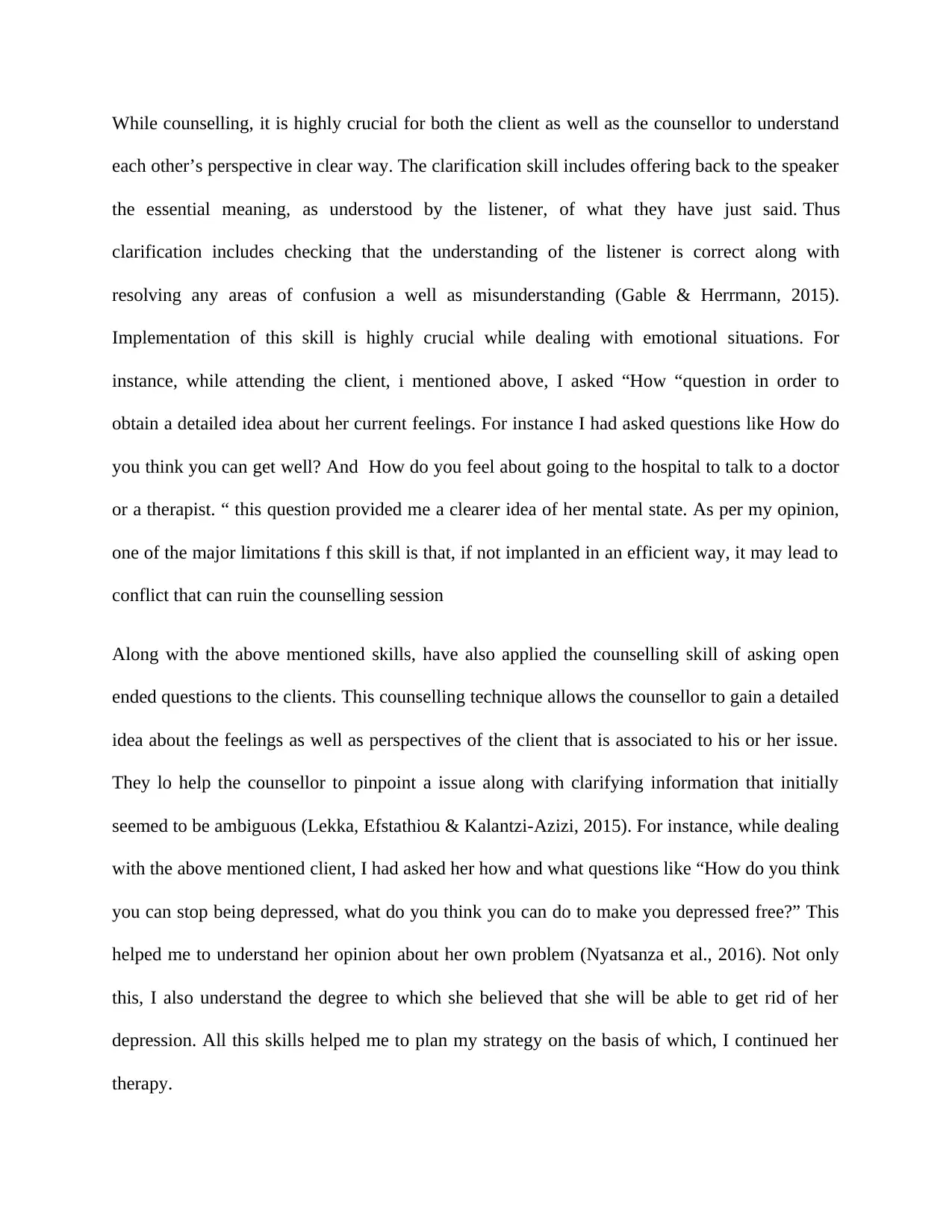
While counselling, it is highly crucial for both the client as well as the counsellor to understand
each other’s perspective in clear way. The clarification skill includes offering back to the speaker
the essential meaning, as understood by the listener, of what they have just said. Thus
clarification includes checking that the understanding of the listener is correct along with
resolving any areas of confusion a well as misunderstanding (Gable & Herrmann, 2015).
Implementation of this skill is highly crucial while dealing with emotional situations. For
instance, while attending the client, i mentioned above, I asked “How “question in order to
obtain a detailed idea about her current feelings. For instance I had asked questions like How do
you think you can get well? And How do you feel about going to the hospital to talk to a doctor
or a therapist. “ this question provided me a clearer idea of her mental state. As per my opinion,
one of the major limitations f this skill is that, if not implanted in an efficient way, it may lead to
conflict that can ruin the counselling session
Along with the above mentioned skills, have also applied the counselling skill of asking open
ended questions to the clients. This counselling technique allows the counsellor to gain a detailed
idea about the feelings as well as perspectives of the client that is associated to his or her issue.
They lo help the counsellor to pinpoint a issue along with clarifying information that initially
seemed to be ambiguous (Lekka, Efstathiou & Kalantzi-Azizi, 2015). For instance, while dealing
with the above mentioned client, I had asked her how and what questions like “How do you think
you can stop being depressed, what do you think you can do to make you depressed free?” This
helped me to understand her opinion about her own problem (Nyatsanza et al., 2016). Not only
this, I also understand the degree to which she believed that she will be able to get rid of her
depression. All this skills helped me to plan my strategy on the basis of which, I continued her
therapy.
each other’s perspective in clear way. The clarification skill includes offering back to the speaker
the essential meaning, as understood by the listener, of what they have just said. Thus
clarification includes checking that the understanding of the listener is correct along with
resolving any areas of confusion a well as misunderstanding (Gable & Herrmann, 2015).
Implementation of this skill is highly crucial while dealing with emotional situations. For
instance, while attending the client, i mentioned above, I asked “How “question in order to
obtain a detailed idea about her current feelings. For instance I had asked questions like How do
you think you can get well? And How do you feel about going to the hospital to talk to a doctor
or a therapist. “ this question provided me a clearer idea of her mental state. As per my opinion,
one of the major limitations f this skill is that, if not implanted in an efficient way, it may lead to
conflict that can ruin the counselling session
Along with the above mentioned skills, have also applied the counselling skill of asking open
ended questions to the clients. This counselling technique allows the counsellor to gain a detailed
idea about the feelings as well as perspectives of the client that is associated to his or her issue.
They lo help the counsellor to pinpoint a issue along with clarifying information that initially
seemed to be ambiguous (Lekka, Efstathiou & Kalantzi-Azizi, 2015). For instance, while dealing
with the above mentioned client, I had asked her how and what questions like “How do you think
you can stop being depressed, what do you think you can do to make you depressed free?” This
helped me to understand her opinion about her own problem (Nyatsanza et al., 2016). Not only
this, I also understand the degree to which she believed that she will be able to get rid of her
depression. All this skills helped me to plan my strategy on the basis of which, I continued her
therapy.
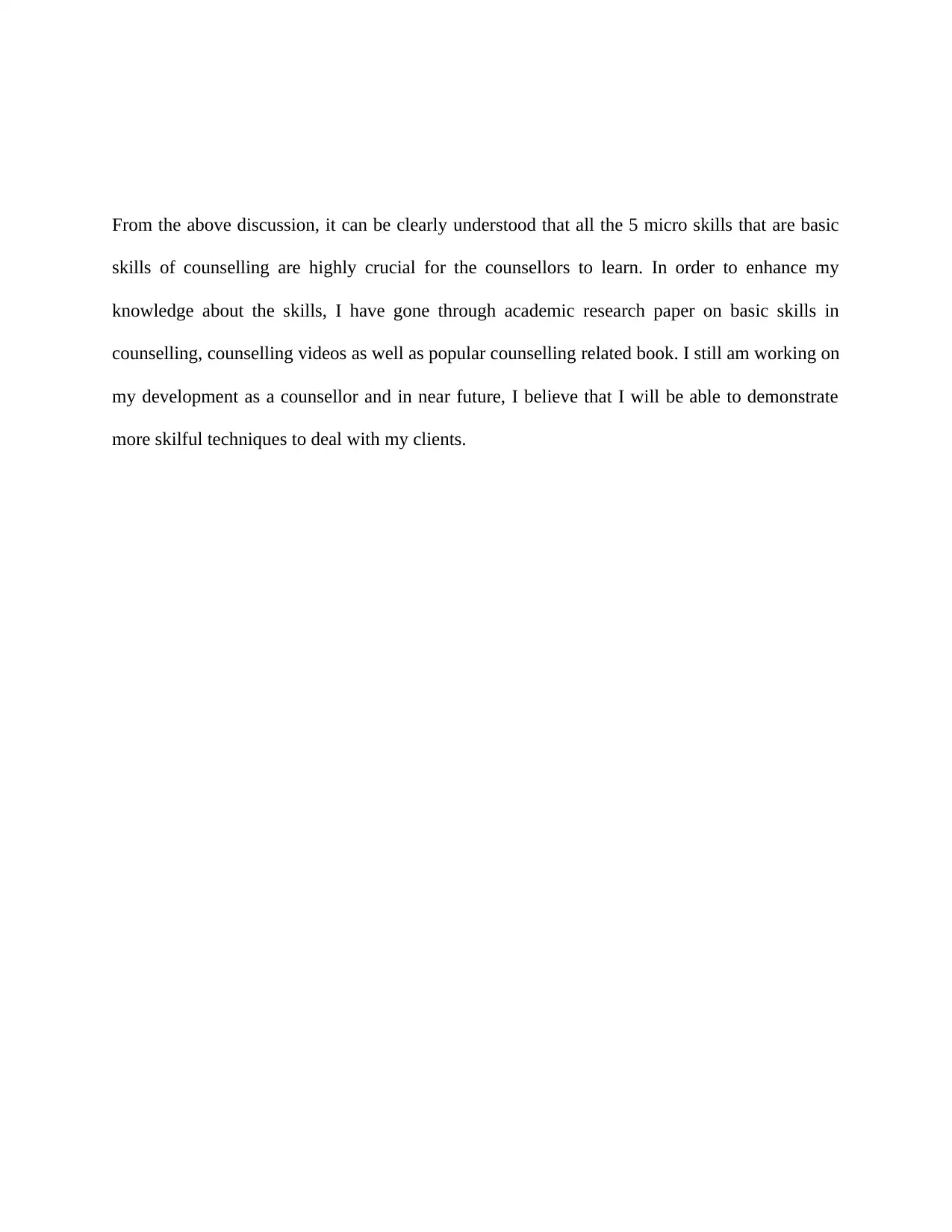
From the above discussion, it can be clearly understood that all the 5 micro skills that are basic
skills of counselling are highly crucial for the counsellors to learn. In order to enhance my
knowledge about the skills, I have gone through academic research paper on basic skills in
counselling, counselling videos as well as popular counselling related book. I still am working on
my development as a counsellor and in near future, I believe that I will be able to demonstrate
more skilful techniques to deal with my clients.
skills of counselling are highly crucial for the counsellors to learn. In order to enhance my
knowledge about the skills, I have gone through academic research paper on basic skills in
counselling, counselling videos as well as popular counselling related book. I still am working on
my development as a counsellor and in near future, I believe that I will be able to demonstrate
more skilful techniques to deal with my clients.
⊘ This is a preview!⊘
Do you want full access?
Subscribe today to unlock all pages.

Trusted by 1+ million students worldwide
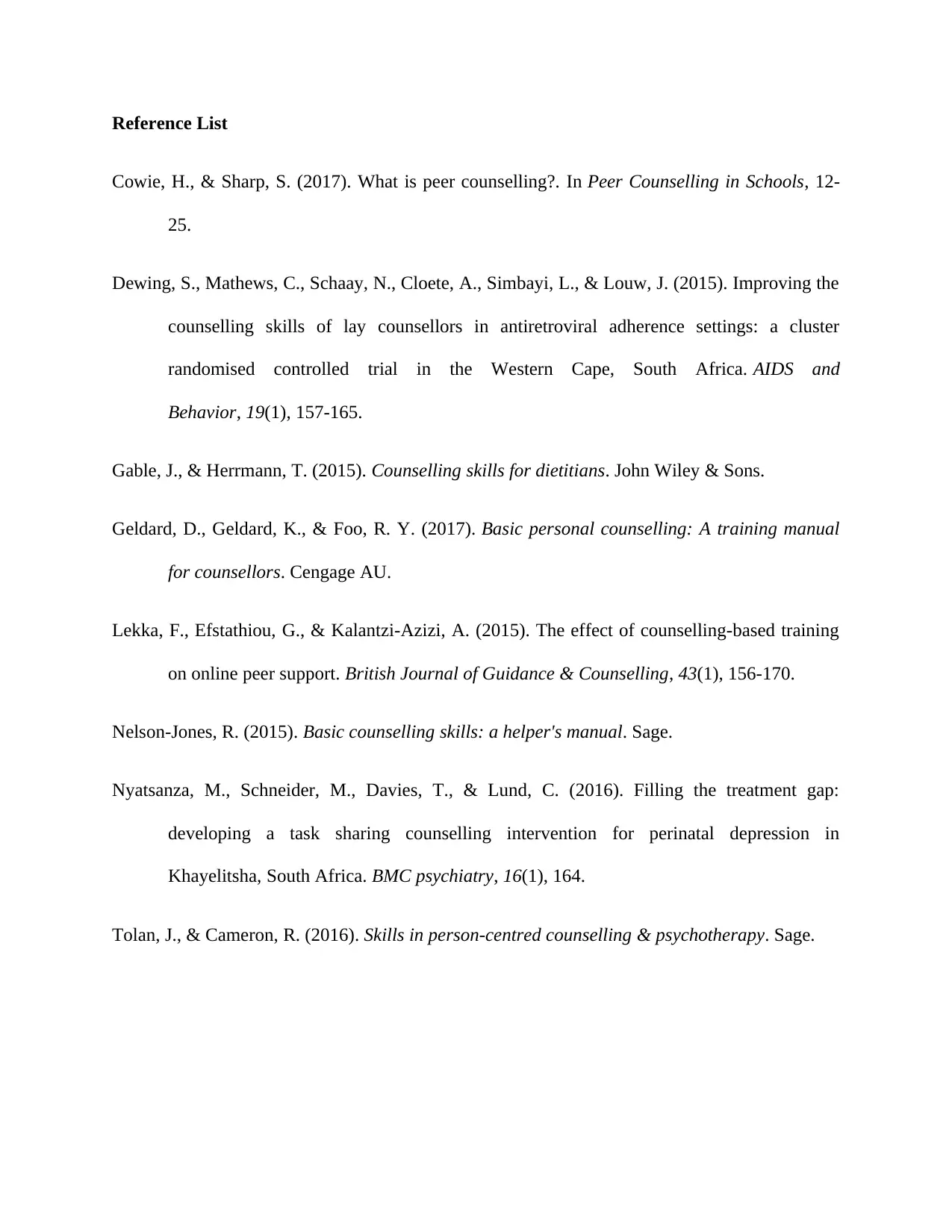
Reference List
Cowie, H., & Sharp, S. (2017). What is peer counselling?. In Peer Counselling in Schools, 12-
25.
Dewing, S., Mathews, C., Schaay, N., Cloete, A., Simbayi, L., & Louw, J. (2015). Improving the
counselling skills of lay counsellors in antiretroviral adherence settings: a cluster
randomised controlled trial in the Western Cape, South Africa. AIDS and
Behavior, 19(1), 157-165.
Gable, J., & Herrmann, T. (2015). Counselling skills for dietitians. John Wiley & Sons.
Geldard, D., Geldard, K., & Foo, R. Y. (2017). Basic personal counselling: A training manual
for counsellors. Cengage AU.
Lekka, F., Efstathiou, G., & Kalantzi-Azizi, A. (2015). The effect of counselling-based training
on online peer support. British Journal of Guidance & Counselling, 43(1), 156-170.
Nelson-Jones, R. (2015). Basic counselling skills: a helper's manual. Sage.
Nyatsanza, M., Schneider, M., Davies, T., & Lund, C. (2016). Filling the treatment gap:
developing a task sharing counselling intervention for perinatal depression in
Khayelitsha, South Africa. BMC psychiatry, 16(1), 164.
Tolan, J., & Cameron, R. (2016). Skills in person-centred counselling & psychotherapy. Sage.
Cowie, H., & Sharp, S. (2017). What is peer counselling?. In Peer Counselling in Schools, 12-
25.
Dewing, S., Mathews, C., Schaay, N., Cloete, A., Simbayi, L., & Louw, J. (2015). Improving the
counselling skills of lay counsellors in antiretroviral adherence settings: a cluster
randomised controlled trial in the Western Cape, South Africa. AIDS and
Behavior, 19(1), 157-165.
Gable, J., & Herrmann, T. (2015). Counselling skills for dietitians. John Wiley & Sons.
Geldard, D., Geldard, K., & Foo, R. Y. (2017). Basic personal counselling: A training manual
for counsellors. Cengage AU.
Lekka, F., Efstathiou, G., & Kalantzi-Azizi, A. (2015). The effect of counselling-based training
on online peer support. British Journal of Guidance & Counselling, 43(1), 156-170.
Nelson-Jones, R. (2015). Basic counselling skills: a helper's manual. Sage.
Nyatsanza, M., Schneider, M., Davies, T., & Lund, C. (2016). Filling the treatment gap:
developing a task sharing counselling intervention for perinatal depression in
Khayelitsha, South Africa. BMC psychiatry, 16(1), 164.
Tolan, J., & Cameron, R. (2016). Skills in person-centred counselling & psychotherapy. Sage.
1 out of 7
Related Documents
Your All-in-One AI-Powered Toolkit for Academic Success.
+13062052269
info@desklib.com
Available 24*7 on WhatsApp / Email
![[object Object]](/_next/static/media/star-bottom.7253800d.svg)
Unlock your academic potential
Copyright © 2020–2026 A2Z Services. All Rights Reserved. Developed and managed by ZUCOL.





